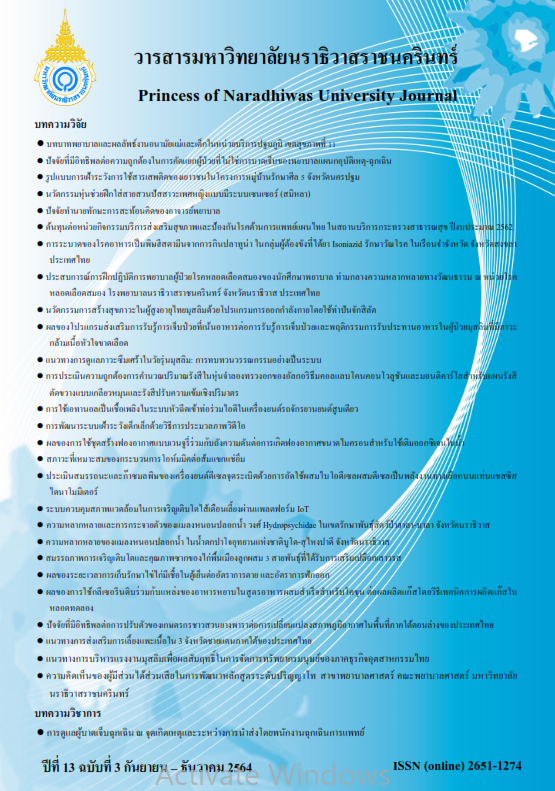Factors Influencing Adaptation of Rubber Plantation Farmers to Climate Change in Lower Southern Thailand
Keywords:
Adaptation, Logistic regression model, Linear relationshipAbstract
The objective of this research was to study factors for adaptation of rubber plantation farmers to climate change in the lower southern Thailand from 400 farmers. This research was choosen group of specific samples. The factors affecting the adaptation was used to analyze the relationship trough Ordered Logit models varied in order. The result revealed that factors affecting to adaptation of rubber plantation farmer consist of 7 variable such as bachelor's degree, experience in rubber plantation, perception of information, suggestion from officer, perception and price of rubber increased. Farmers receive information will result in adapting to climate change. 82.50% significance at a 95% of the sample group of farmers.
References
Akekaluk, N. (2017). Adaptation to Climate Change of The ruber planters in Rayong. Journal of NRRU Community Research, 11(1), 75-84.
Buncha, S., & Parinya, C. (2018). Economic and social adjustment of rubber farmers in farming systems, small rubber plantations For development Quality of life, environment and household economym in the south of Thailand. Journal of Safe food system Create Added Value and Use Resources Sustainably, 2005, 95-109.
Chaiya, K., & Buncha, S., (2019). Causes of Problems in driving diversify Production Systems in rubber Plantations roots of Problems and Alternative as of Rubber Farmers Under Declining rubber Prices. Journal of Business Administration and Social Sciences, 1(3), 1-16.
Chinvanno, S. (2009). Future Climate Projection for Thailand and Surrounding Countries: Climate change scenario of 21 st century. The Fist China-Thailand Joint Seminar on Climate Change Thailand Research Fund (TRF) and National Natural Science Foundation of China 23-24.
Chula Unisearch. (2011). Effect of Climate change and Future climate variability and Adaptation ofkey sectors Thailand. Retrieved October 9, 2020 from https://www.chula.ac.th/cu-services/ academic-services/chula-unisearch/.
Department of Agricultural Extension. (2019). Report of the rubber plantation area Farmer registration Thailand. Retrieved October 9, 2020 from ttps://www.doae.go.th/service.php.
Griffiths, W., Guay C., & Hill, R. (2008). Principles of Econometrics. 3. Günther, F. and al., et. (2008). Socio-economic and climate change impacts on agriculture: an integrated assessment, Philosophical Transactions of The Royal Society, 1990-2080.
Intergovernmental Panel on Climate Change (IPCC). (2007). Climate Change 2007: Synthesis Report IPCC Fourth Assessment (AR4). Retrieved April 24, 2020 from http://www.ipcc.ch,.dld .go.th/splb_lbr/pubdoc2.htm.
Jareewan, C. (2019). Impact of Climate Change on Oil Palm Production in Southern Thailand. Journal of RMUTSV Research, (11), 54-66.
Kirk, P., Wi-Nai, S., Somchai, P., Sukij, R., Sawaschai, K., Sompong, C., & Dapun, K. (2009). Impacts of Global Warming on Rice, Sugarcane, Cassava and Maize Production in Thailand. The Thailand Research Fund. Retrieved April 24, 2020 from https://elibrary.trf.or.th /project_content.asp?PJID =RDG5130007.
Kulaya, W. (2011). Research statistics. Principles for selecting statistical techniques in research and explaining the results obtained from SPSS Thailand. Retrieved 15 October 2020.
Natewadee, P. (2018). The Factors Related to the Income of the Rubber Farmers in the Three Southern Border Provinces. Journal of Silpakorn University, 11(2), 3596-3617.
Nirote, S., (2019). Impacts of Climate Change and Adaptation Simulation for Risk Reduction of Rain-fed Rice Production in Central Region. Journal of Economics and Public Policy, 10(19), 36-58.
Palakorn, S., & Purawich, P. (2018). Factors Related to Change in Quality of Life of Para-rubber Farmers from Low Para-rubber Prices Problem in Srinakharin District, Phatthalung Province. Journal of Humanities and Social Sciences Mahasalakham University, 3(2018), 71-84.




